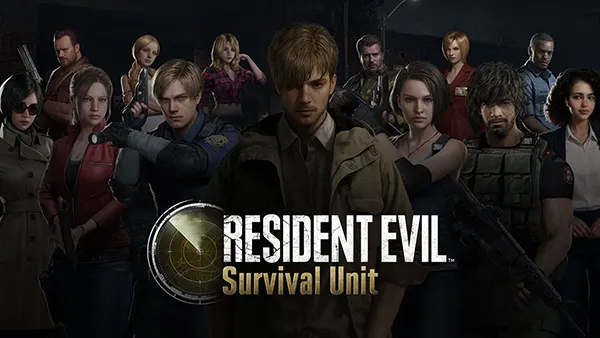Resident Evil Survival Unit — Strategy in a Horrific Setting

Resident Evil Survival Unit is a mobile strategy game set in the familiar survival horror universe of Capcom’s legendary franchise. Released in 2025, it combines tactical resource management with the terrifying atmosphere of the Resident Evil series. Players are tasked with building safe zones, leading squads against mutated threats, and ensuring long-term survival in a collapsing world. Unlike traditional action-driven instalments of Resident Evil, this title focuses on planning, coordination, and strategic thinking in a dark and dangerous environment.
Core Gameplay Mechanics
The foundation of Resident Evil Survival Unit lies in its blend of strategy and horror. Players manage survivor bases, allocate resources, and expand defences against an evolving enemy presence. The balance between offensive missions and defensive stability is critical, as failing in one aspect can cause the entire unit to collapse. Strategic decisions influence whether survivors thrive or fall prey to infection.
The game introduces a real-time decision-making system. Missions are time-sensitive, forcing players to weigh the risks of exploration against the safety of their camp. This mechanic ensures that no two sessions feel identical, enhancing replay value and tension. The horror element is ever-present, not just through enemies but also through scarce supplies and constant risk of infection spreading within the group.
Character management plays a vital role. Each survivor possesses unique abilities, strengths, and weaknesses. Proper squad composition can make the difference between success and disaster. Some characters excel in combat, while others are crucial for medical support or resource gathering. The player’s ability to adapt their strategy according to available survivors is at the heart of progression.
Resource Management and Base Development
Building and maintaining a secure base is central to the experience. Players must allocate food, medicine, and ammunition carefully. Shortages can lead to lowered morale, disease outbreaks, and even rebellion within the unit. Expanding facilities such as infirmaries, watchtowers, and research labs helps to strengthen survival chances.
The game’s economy is tightly connected to mission performance. Successful expeditions provide materials, but poor planning can lead to significant losses. This creates a cycle of risk and reward, where each choice has lasting consequences. The horror is not only about external threats but also about the internal struggle to keep the group alive with limited resources.
Players also need to defend their base from waves of infected. These sieges test how well-prepared the unit is and demand tactical placement of barricades, traps, and armed patrols. Every decision impacts the survivability of the community, reinforcing the importance of planning over brute force.
Horrific Setting and Atmosphere
True to its roots, Resident Evil Survival Unit delivers an oppressive atmosphere. The environments are crafted with eerie detail: abandoned towns, contaminated laboratories, and forests shrouded in mist. Each area presents unique challenges, forcing players to adapt their strategies to survive. The constant threat of ambushes ensures that tension never fades.
The game incorporates weather effects and day-night cycles, both of which affect gameplay. Night missions heighten the risk of surprise attacks, while storms can hinder visibility and reduce combat efficiency. These mechanics contribute to an immersive horror strategy experience, demanding constant vigilance from players.
Sound design also plays a major role. Distant growls, sudden screams, and unsettling silence build psychological pressure. The soundtrack blends low tones with sharp bursts of sound, mirroring the unpredictability of the infected and amplifying the sense of dread. This ensures that even routine tasks feel charged with tension.
Storyline and Narrative Integration
The narrative ties directly into the broader Resident Evil universe. Players uncover documents, radio transmissions, and survivor testimonies that shed light on the outbreak. While the storyline is not linear, it gradually reveals the origins of the infection and the hidden motives of certain factions.
Decisions during missions affect the narrative outcome. Choosing to rescue survivors instead of gathering supplies might change alliances later in the game. This branching structure gives the player agency in shaping the fate of their unit and the overall story. The replayability factor is strong, as multiple endings encourage different playthroughs.
Fan-favourite characters occasionally appear in cameo roles, linking the mobile strategy game to the main series timeline. These appearances provide continuity for long-time fans without overshadowing the unique direction of this instalment. The balance between familiar lore and new storytelling strengthens the game’s identity within the franchise.

Multiplayer and Community Features
Resident Evil Survival Unit also introduces cooperative and competitive elements. Players can team up with friends to defend shared outposts or engage in large-scale missions requiring coordinated tactics. This mode highlights teamwork, as one player’s mistake can compromise the survival of the entire group.
Competitive events challenge units to survive the longest against escalating waves of infected. Rankings are updated weekly, offering rewards for top performers. These events add replay value and create a sense of global community among players who share strategies and survival tips.
The developers have also announced regular updates with seasonal content, new enemies, and limited-time missions. This ensures that the game remains fresh throughout 2025 and beyond, maintaining engagement within a dedicated player base. The evolving structure mirrors the unpredictability of the Resident Evil universe itself.
Future Prospects and Player Reception
Since its launch, Resident Evil Survival Unit has been well-received for successfully adapting survival horror into a mobile strategy format. Critics highlight its balance between tactical depth and atmospheric tension, while players appreciate its replayability and narrative flexibility. It stands as an innovative entry in the series, expanding its reach into a new genre.
Future updates are expected to expand the storyline further, introducing new regions and enemy types. Community feedback has already influenced adjustments in balance and mission variety, showcasing the developers’ commitment to long-term support. This two-way interaction enhances trust and loyalty among players.
As a result, Resident Evil Survival Unit is not only a compelling strategy game but also a significant milestone for the franchise. It demonstrates how established universes can evolve through fresh gameplay mechanics without losing their identity. In 2025, it remains one of the most engaging titles in the mobile strategy genre with a strong horror foundation.




